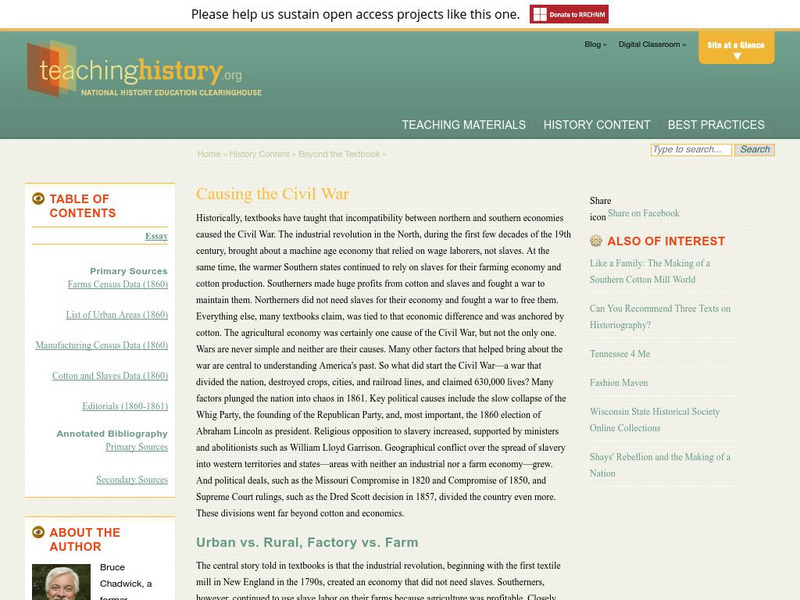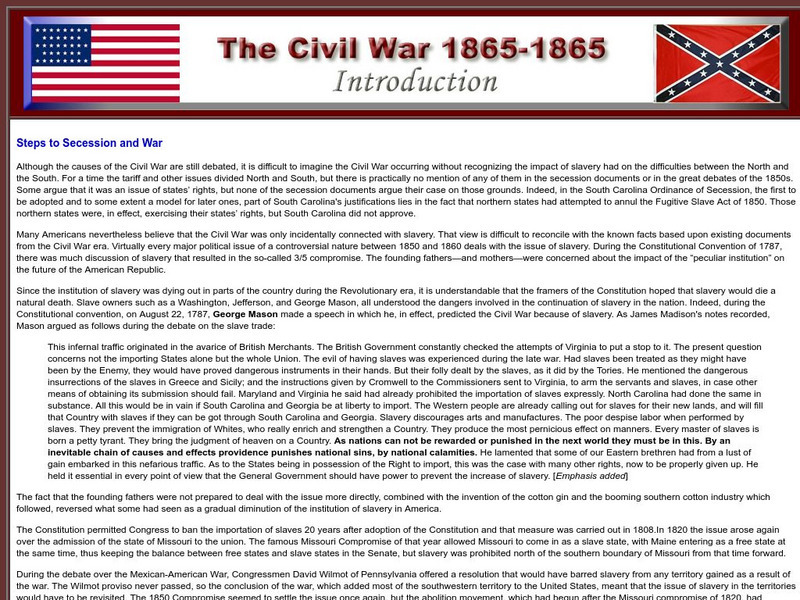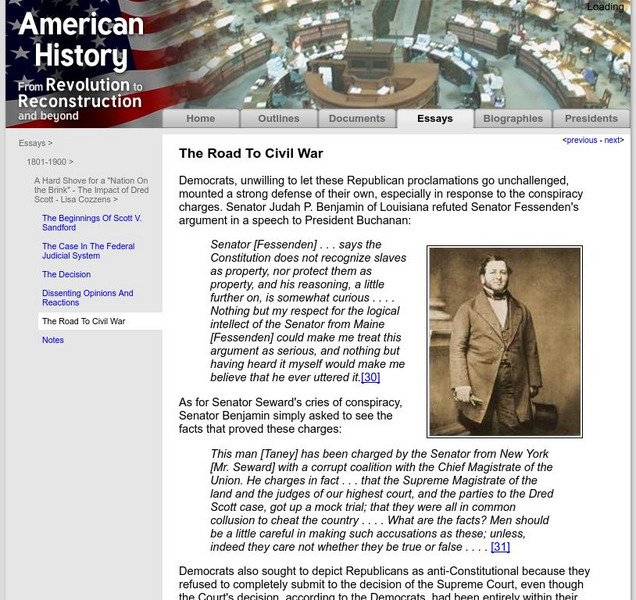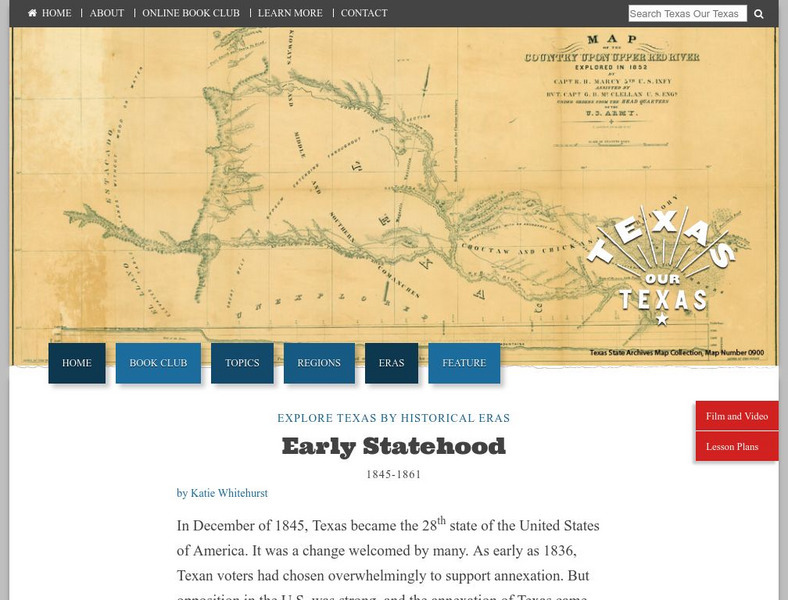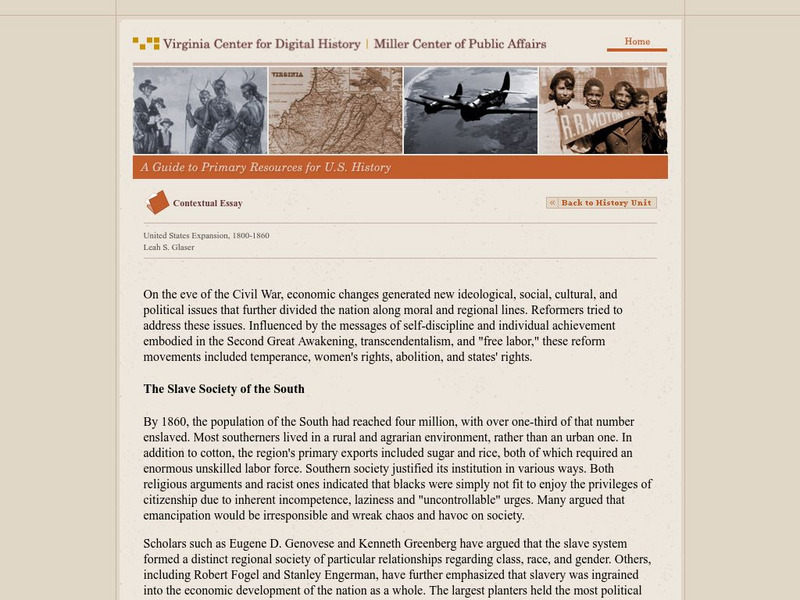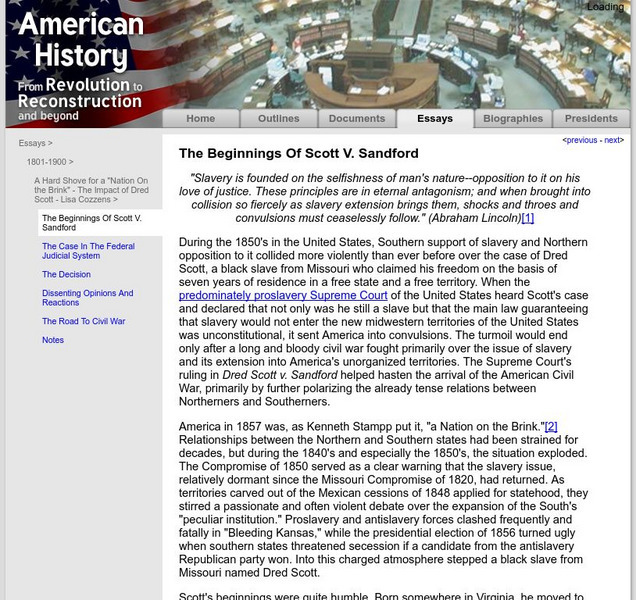Roy Rosenzweig Center for History and New Media
Teaching History: Beyond the Textbook: Causing the Civil War
An essay that looks at other, more complex reasons for the outbreak of the Civil War, beyond the traditionally accepted ones related to the Northern industrial economy versus the Southern agricultural one.
Henry J. Sage
Sage American History: Civil War Introduction
Article introducing the Civil War. The author provides background information on the debates between the North and South eventually leading to war.
University of Groningen
American History: Essays: Impact of Dred Scott: The Road to Civil War
After the Dred Scott decision by the US Supreme Court, the friction between the North and South over slavery escalated, and the North began to fear that they might not be able to prevent slavery from spreading into their states. The Dred...
Scholastic
Scholastic: New York Times Upfront: The Civil War: Ten Things You Should Know
Article written on the 150th anniversary of Fort Sumter, the beginning of the American Civil War, in which the author presents little known Civil War facts about topics such as, Americans during that time, slavery, new technologies,...
A&E Television
History.com: How Civil War Medicine Led to America's First Opioid Crisis
During the Civil War, military hospitals considered opioids to be essential medicine. Doctors and nurses used opium and morphine to treat soldiers' pain, stop internal bleeding and mitigate vomiting and diarrhea caused by infectious...
University of Groningen
American History: Essays: The Black Lost Cause: Examples of Colored Service
African American slaves are known to have fought for the Confederacy during the Civil War, which many people may not realize. Why they would fight on the side of slavery, and the evidence that they did, are discussed in this section of...
A&E Television
History.com: How Black Women Fought for Civil War Pensions and Benefits
In a time when military pensions were a large part of the federal budget, Black women faced unique challenges in securing compensation. Widows of Civil War soldiers could begin applying to the Bureau of Pensions during the war, and one...
Other
Binghamton University: Lincoln, Labor and Liberation
The free labor ideology of the nineteenth century was grounded in the beliefs that Northern free labor was superior to Southern slave labor. It was this free labor ideology and not the republicanism of the Revolutionary War era that...
Immigration and Ethnic History Society
Iehs: Katherine S. Carper, "Difficulty of Studying "Immigrants" in Early 19th C"
This article focuses on the study of immigrants in the early 19th century before the Civil War. Migration policy was primarily under state rather than federal control, and as long as slavery existed, there was no national definition of...
Virginia Historical Society
Virginia Historical Society: Waging War: The Battlefront: Men of Color to Arms?
When the war began, many African Americans - North and South - volunteered to serve as soldiers. The vast majority were former slaves who sought to strike at slavery and improve their position in society. Desperate to avert defeat, the...
Texas Public Broadcasting
Texas Pbs: Texas Our Texas: Early Statehood 1845 1861
Examines the circumstances surrounding Texas's entry into the Union in 1845 as a slave state. It was an uneasy union, with ongoing controversy around the issue of slavery. This lasted through the Mexican-American War and helped to...
University of Virginia
Virginia Center for Digital History: United States Expansion, 1800 1860
An essay that looks at issues affecting Americans leading up to the Civil War. These included economic changes that led to new ideological, social, cultural, and political issues that further divided the nation along moral and regional...
University of Groningen
American History: Essays: Impact of Dred Scott: Beginning Scott v Sandford
Explains the background for the Dred Scott case and its journey through the court system, finally reaching the US Supreme Court.
Siteseen
Siteseen: American Historama: Lincoln Douglas Debates
Discussion of the Lincoln Douglas Debates, a series of seven public debates held in 1858 between Republican Abraham Lincoln and Democrat Stephen Douglas as they contested the Illinois Senate seat.
Siteseen
Siteseen: American Historama: Emancipation Proclamation Facts
Provides an overview and ten facts about Abraham Lincoln's Emancipation Proclamation, a war measure freeing the slaves in states still in rebellion against the Union.
